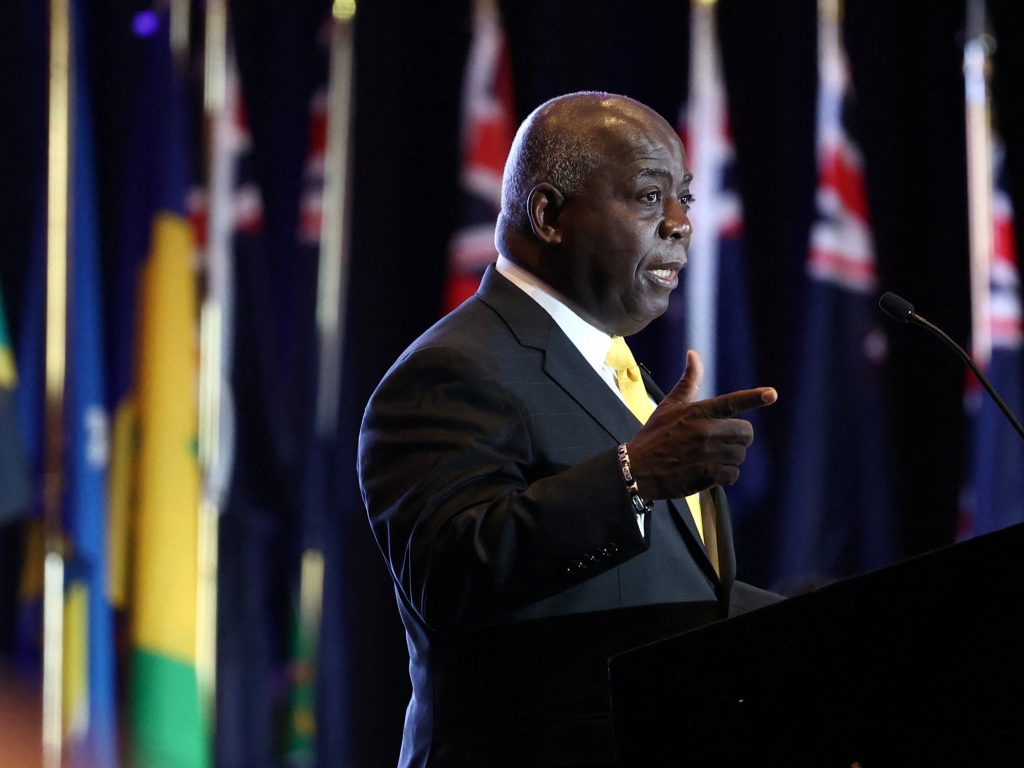After three years of economic stress heightened by COVID-19 and international conflict, The Bahamas and the rest of the Caribbean are ready to move toward a future of energy security, economic development, and greater regional integration according to Philip Davis, prime minister of The Bahamas and chair of the Caribbean Community (CARICOM).
To get there, though, they’ll need other nations to provide more help than they have in the past, said Davis. “We are gratified that the United States has reengaged with us,” remarked Davis, referring to the United States as “kith and kin.”
Speaking on Tuesday at an Atlantic Council Front Page event, Davis was hopeful following a meeting with US Vice President Kamala Harris in Washington, DC.
Still, the Bahamian leader did not mince his words when speaking of the challenges the Caribbean faces, as climate change continues to increase the frequency of deadly hurricanes and global instability continues to drive some of the highest energy and food prices in the Western Hemisphere.
Read on for more highlights from his remarks and conversation with Jason Marczak, senior director of the Adrienne Arsht Latin America Center at the Atlantic Council.
“Climate change must be more than a buzzword”
- “Small-island and developing states throughout the Caribbean must come to terms with the full extent of our vulnerability,” Davis said in light of the rising threat that climate change poses to the region. He cited the particularly grim challenge facing Dominica, an island nation in the Lesser Antilles, which is still recovering nearly five years after Hurricane Maria hit. Davis said that the hurricane inflicted so much damage that 50 percent of the country’s gross domestic product essentially blew away in a single night—a fate more Caribbean countries could face if climate change continues unabated.
- As hurricanes and rising water levels further threaten Caribbean islands, it is becoming more urgent to fully fund climate initiatives. “What we need is more access to climate-change-specific funding to mitigate the damage being inflicted each day,” Davis said.
- On working toward a switch to renewable energy: “We must first acknowledge that this is not a one size fits all discussion,” Davis said. The issues facing oil-rich countries, such as Trinidad and Tobago, are vastly different from those of his own country, Davis added, where the pivot to solar energy is more immediately necessary as energy costs soar.
More banks, more security
- Since 2015, access to global finance has quickly worsened for many Caribbean countries and businesses as many international banks and financial institutions operating in the region have chosen to de-integrate and de-bank, cutting off their services from the region. Countries whose economic development depends on remittances, such as Jamaica and Haiti, or tourism, such as The Bahamas and those in the Eastern Caribbean, have been hit particularly hard, Davis explained.
- “Sixty percent of unbanked adults in the region cite cost as a barrier to financial services,” Davis said, stressing the need to give Caribbean citizens access to financial services. “In the Bahamas, on less populated islands, people have been left without a single commercial bank.” He highlighted the work of the Atlantic Council Caribbean Initiative’s Financial Inclusion Task Force, calling it “a conduit for solving these persistent issues.”
- Caribbean citizens are feeling the effects of global crises in the form of worsening financial access, high electricity prices, and food insecurity. “CARICOM suggests that as much as 57 percent of the English-speaking Caribbean faces food-security issues,” Davis said. Together, Davis said, CARICOM’s “work can save lives and livelihoods” as “we have an opportunity to make historic advancements in regional energy security, food security, and financial inclusion.”
A partner to the north
- Davis was happy to be able to meet “one on one, face to face” with Harris, hoping that Washington and Nassau will continue to strengthen relations after a period of relative silence from the White House. “Nature abhors a vacuum,” Davis said, “and if attention is not paid, someone else will pay the attention.”
- The Bahamas can also be a partner to the United States on regional security issues. “We are on the migratory path to the United States, and many don’t get there. They stay in The Bahamas,” Davis said, while referencing a recent wave of Haitian migrants making their way to the United States in the wake of severe political instability in Haiti.
Nick Fouriezos is an Atlanta-based writer with bylines from every US state and six continents. Follow him on Twitter @nick4iezos.
Watch the full event
Image: Prime Minister of the Bahamas Philip Davis speaks at an event where leaders of Caribbean nations meet for a two-day conference to discuss the region's approach to the COP27 climate talks, in Nassau, Bahamas August 16, 2022. REUTERS/Dante Carrer.
